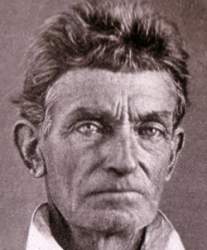Record Data
Transcription
Old Brown and his Friends
The attempt to manufacture a hero out of this old horse thief and murderer, is kept up with commendable assiduity by the Northern newspapers and pulpits. In the Boston Atlas, a letter to him from a Quaker lady in Newport, in which he thanks her for her fidelity to the “poor that cry and those that have no help,” and say, that “for this he is a prisoner in bonds,” is published with a request that the Newport papers will copy. The old murderer seems bent upon maintaining his consistency to the last, and, as he has lived the life of a criminal, to die with a lie in his mouth, as criminals of his grade usually die. He takes no account of the twenty odd deaths he has occasioned, and never alludes to the possibility that he may be under arrest for something else besides than giving help to the poor. He seems very much to regret, on the contrary, that he did massacre the citizens whom he roused out of their beds, as he did the five victims on the Potawatimie [Pottawatomie] Creek, and indeed, it would have been much more in character. He cannot forgive himself for the omission. In his eyes, it was a blunder, and men like Brown think it far more inexcusable to perpetrate a blunder, than to commit a crime. His language is affecting. “It is,” says he “solely my own fault in a military point of view, that we met with our disaster-I mean, that I mingled with our prisoners, and so far sympathized with them and their families, that I neglected duty in other respects.” The meaning of which is, that he was very wrong, after having dragged these men out of their beds at midnight, not to have put them to death on the spot, instead of having allowed himself to be moved by compassion for them and their families.


